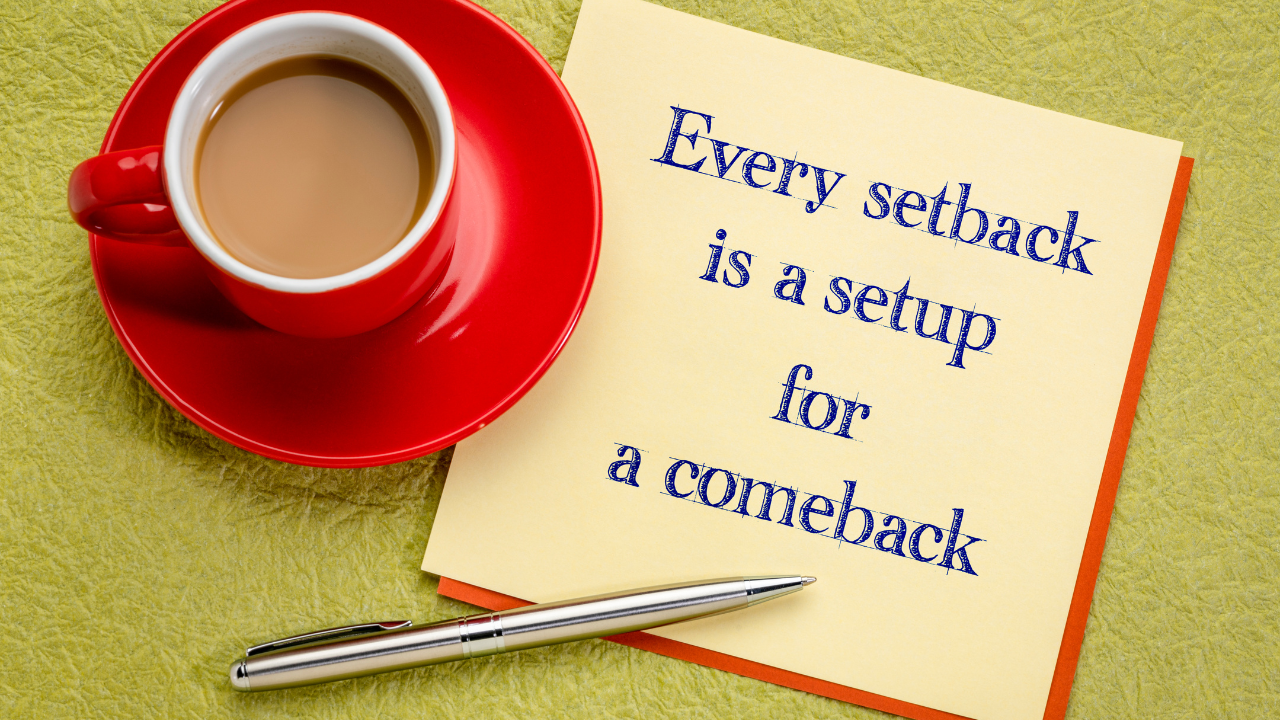Turning Setbacks Into Success: The Key to Resilience, Strength, and Leadership
Jan 27, 2025
Setbacks are inevitable. Whether it's a missed goal, an unforeseen challenge, or a disruption in life’s momentum, setbacks can feel like roadblocks to success. But what if these moments were not the end of the journey but pivotal opportunities for growth? Understanding and overcoming setbacks is essential for a healthy, sustainable lifestyle, mental and physical strength, and excelling as a high-performing leader.
Why Setbacks Feel Overwhelming
Setbacks challenge us emotionally, cognitively, and physically. Emotionally, they trigger self-doubt, fear, and frustration, leading to feelings of helplessness. Cognitively, setbacks often cause overthinking and stress, impairing decision-making. Physically, they disrupt the neurochemical balance, reducing dopamine (the reward neurotransmitter) while spiking cortisol (the stress hormone). This combination can leave you feeling stuck and unmotivated.
Cultural and social expectations make setbacks even harder. Society often glorifies relentless success, leaving little room for failure. As a result, setbacks may feel like personal shortcomings rather than growth opportunities.
The Importance of Overcoming Setbacks
Overcoming setbacks is more than just regaining momentum—it is essential for thriving in all areas of life. When you face setbacks head-on, you develop resilience, strengthen your mental and physical health, and build the skills needed to excel as a leader.
For a sustainable lifestyle, setbacks teach you to manage stress and adapt routines to maintain balance. They help build emotional regulation, which is essential for mental strength, and reestablish habits supporting physical health. As a leader, setbacks provide opportunities to demonstrate adaptability and inspire others, fostering trust and innovation in your team.
The Science Behind Setbacks and Growth
The brain’s neuroplasticity—its ability to rewire and adapt—enables us to turn setbacks into growth opportunities. When approached correctly, setbacks stimulate critical areas of the brain:
- The Prefrontal Cortex: Problem-solving and decision-making improve as the brain practices overcoming challenges.
- Resilience Pathways: Repeatedly recovering from setbacks strengthens neural pathways associated with resilience, making future obstacles easier to navigate.
- Stress Regulation: Techniques like deep breathing and mindfulness calm the amygdala and reduce cortisol levels, restoring emotional balance.
10 Strategies to Overcome Setbacks
These strategies provide a practical roadmap for transforming challenges into growth opportunities.
- Acknowledge the Setback
The first step to overcoming any setback is recognizing and accepting it. Denial only delays progress. By naming your emotions—frustration, disappointment, fear—you allow yourself to process them and move forward with clarity.
- Reframe the Narrative
Shift your perspective from viewing the setback as a failure to seeing it as an opportunity for growth. Ask empowering questions like, “What can I learn from this?” Focus on the lessons and let them guide your next steps.
- Regulate Your Stress Response
Stress can cloud judgment and hinder decision-making. Use stress-reduction techniques to calm your mind:
- Deep Breathing: Inhale for 4 seconds, hold for 7 seconds, exhale for 8 seconds. Repeat 5 times.
- Mindful Movement: Engage in yoga, stretching, or a walk to lower cortisol and restore focus.
- Break Down Goals into Smaller Steps
Large goals can feel overwhelming after a setback. Break them into smaller, manageable actions. Each step forward builds momentum and boosts dopamine levels, restoring your motivation.
- Reflect on the Root Cause
Understanding why the setback occurred is key to preventing it in the future. Was it due to a lack of preparation, unrealistic expectations, or external factors? Pinpointing the cause helps you develop a more effective plan moving forward.
- Focus on What You Can Control
Redirect your energy toward factors within your influence. While you can’t change the past, you can control your attitude, response, and next steps. This focus restores a sense of agency and reduces feelings of helplessness.
- Seek Guidance and Support
Navigating setbacks is easier with a support system. Reach out to mentors, friends, or coaches for advice and encouragement. They can offer fresh perspectives and remind you of your strengths when you feel stuck.
- Cultivate Resilience Through Self-Care
Resilience is built through consistent self-care. Prioritize activities that replenish your energy, such as quality sleep, balanced nutrition, and regular exercise. A strong mind and body are better equipped to handle challenges.
- Celebrate Small Wins
Every step forward is progress. Celebrate small achievements to reinforce positivity and motivation. Whether it’s completing a task or reestablishing a routine, acknowledging your efforts keeps momentum high.
- Visualize Future Success
Your brain responds to visualization as if it’s real. Imagine yourself overcoming the setback and achieving your goals. This practice strengthens confidence and trains your brain to focus on possibilities instead of limitations.
As a leader, how you handle setbacks sets the tone for those you influence. By staying composed and adaptable, you inspire confidence and demonstrate resilience. Setbacks can also spark innovation and strengthen relationships, challenging you to think creatively and lead with empathy.
Setbacks are not a sign of failure - they are a part of growth. Overcoming them builds resilience, fosters sustainable habits, and equips you with the tools to handle future challenges. By embracing setbacks as opportunities to learn and adapt, you’ll not only achieve personal growth but also inspire others to reach their fullest potential.
Ready to tackle your setbacks? Start small, stay consistent, and remember: that resilience is a skill, and every setback is an opportunity to strengthen it.
This blog is not meant to diagnose or treat any medical conditions. Instead, it aims to provide an overview and present a new perspective.
This content is not based on a specific research study. It is for informational purposes only and not a substitute for professional medical advice. Always consult your healthcare provider with any health concerns. Please read the full Terms and Conditions here.


